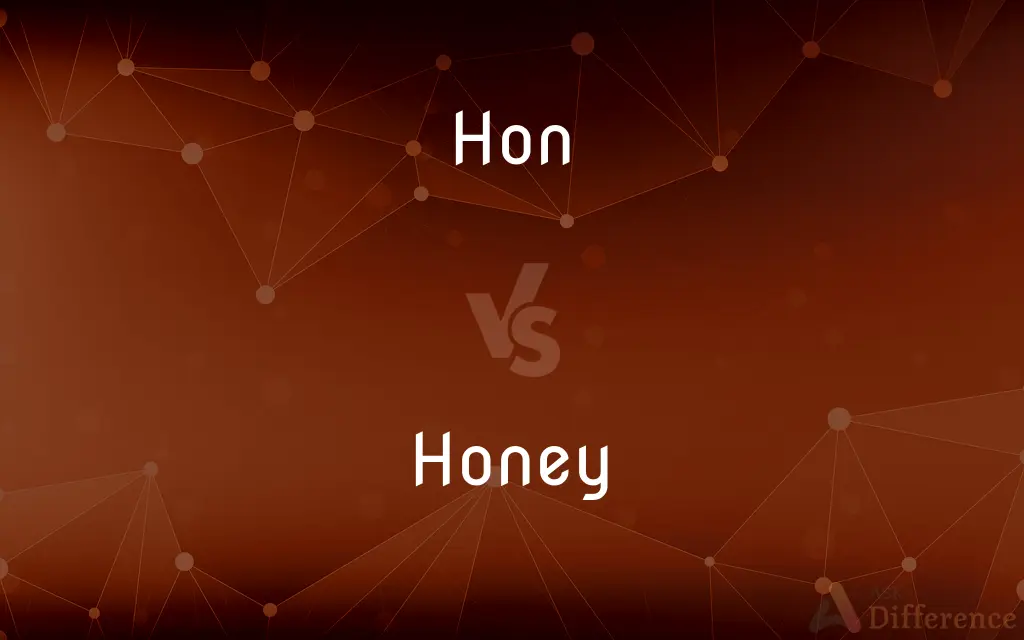Hon vs. Honey — What's the Difference?
Edited by Tayyaba Rehman — By Maham Liaqat — Updated on April 4, 2024
"Hon" is an affectionate shorthand for "honey," often used casually, while "honey" is a sweet substance made by bees or a term of endearment.

Difference Between Hon and Honey
Table of Contents
ADVERTISEMENT
Key Differences
"Hon" and "honey" share a similar context in terms of endearment but vary in their levels of formality and usage. "Hon" is a colloquial abbreviation of "honey," used informally to address someone affectionately, implying familiarity and warmth. It is often heard in casual conversations or as a term of endearment among close individuals. On the other hand, "honey" refers to the sweet, viscous food substance made by bees from floral nectar, celebrated for its flavor and nutritional benefits. Additionally, "honey" is used as a term of endearment in a broader context, suggesting warmth, affection, and sweetness in relationships.
In terms of usage, "hon" is predominantly seen and heard in informal settings, capturing a casual tone when addressing someone affectionately. It's a term that suggests a significant degree of familiarity and comfort between the individuals involved. "Honey," as a term of endearment, carries a more universal application, utilized in both casual and more serious, intimate contexts. It's a versatile term that conveys affection across a spectrum of relationships, from familial bonds to romantic partnerships.
The origin of "hon" as a shorthand version of "honey" reflects linguistic evolution and the tendency for words to be abbreviated in casual speech. Both terms, however, draw from the sweetness and value attributed to honey as a natural product, symbolizing the sweetness and preciousness of the person being addressed. This symbolic link underscores the affectionate connotations of both terms when used in personal interactions.
While "honey" as a food item holds a distinct place in culinary and medicinal contexts, known for its sweetness, nutritional properties, and versatility in recipes, "hon" does not share this dual meaning. The distinction between their uses emphasizes the adaptation of "honey" in language to express endearment, extending its significance beyond its original, tangible context to embody qualities of warmth and affection in human relationships.
Despite their differences, both "hon" and "honey" enrich the English language with expressions of affection, each serving its unique role in communication. "Hon" offers a concise, informal option, reflecting modern conversational trends, whereas "honey" maintains its broader, timeless appeal both as a descriptor of sweetness and as a heartfelt term of endearment.
ADVERTISEMENT
Comparison Chart
Definition
Informal term of endearment, shorthand for "honey."
A sweet substance made by bees; also a term of endearment.
Usage
Casual, implies familiarity and warmth.
Versatile, used in both culinary and affectionate contexts.
Context
Predominantly informal and conversational.
Both informal and formal, broader application.
Connotations
Familiarity, affection.
Sweetness, affection, value.
Dual Meaning
No, used only as a term of endearment.
Yes, refers to both a food substance and affection.
Compare with Definitions
Hon
An affectionate nickname or shorthand for honey.
Could you pass the salt, hon?
Honey
Widely recognized and used across various cultures and languages.
Honey is a common ingredient in many traditional remedies worldwide.
Hon
Used in casual or informal contexts.
The waitress asked, What can I get for you, hon?
Honey
A sweet, viscous food substance produced by bees, and a term of endearment.
I add honey to my tea for sweetness.
Hon
Often associated with American English, especially in certain regions.
Hey, hon, how's it going? is a common greeting in some parts of the U.S.
Honey
Symbolizes sweetness and preciousness in both literal and metaphorical senses.
Honey has been used for centuries for its medicinal properties.
Hon
Implies a sense of warmth and affection.
Don't worry about it, hon. Everyone makes mistakes.
Honey
Broad, spanning culinary, medicinal, and affectionate contexts.
You're the sweetest, honey.
Hon
Limited to terms of endearment.
Thanks, hon, for helping me out.
Honey
Applies to a food product and as a nickname.
Honey, can you help me with this?
Hon
(mostly as a term of address) Honey, sweetheart, a term of endearment; (Southern US) a friendly term of address.
Hey, hon! How was your day at work?
Honey
Honey is a sweet, viscous food substance made by honey bees and some related insects, such as stingless bees. Bees produce honey from the sugary secretions of plants (floral nectar) or from secretions of other insects (such as honeydew), by regurgitation, enzymatic activity, and water evaporation.
Hon
|derogatory}} A trans woman who does not pass; a clocky trans woman. section=Transgender derogatory terms
Honey
A sweet, sticky yellowish-brown fluid made by bees and other insects from nectar collected from flowers.
Hon
; (typically) cheering a sports team, especially a GAA team; exhortation or encouragement come on; congratulations well done, bravo
Honey
An excellent example of something
It's one honey of an adaptation
Honey
A sweet yellowish or brownish viscid fluid produced by various bees from the nectar of flowers and used as food.
Honey
A similar substance made by certain other insects.
Honey
A sweet substance, such as nectar or syrup.
Honey
Sweetness; pleasantness
"The first few years could not have been all honey" (Nadine Gordimer).
Honey
(Informal) Sweetheart; dear. Used as a term of endearment.
Honey
(Informal) Something remarkably fine
A honey of a car.
Honey
To sweeten with honey; add honey to.
Honey
To make pleasant or appealing
His words were honeyed as he spoke.
Honey
To give a yellow or golden color to.
Honey
(uncountable) A viscous, sweet fluid produced from plant nectar by bees. Often used to sweeten tea or to spread on baked goods.
The honey in the pot should last for years.
Honey
(countable) A variety of this substance.
Honey
(rare) Nectar.
Honey
(figuratively) Something sweet or desirable.
Honey
A term of affection.
Honey, would you take out the trash?
Honey, I'm home.
Honey
A woman, especially an attractive one.
Man, there are some fine honeys here tonight!
Honey
A spectrum of pale yellow to brownish-yellow colour, like that of most types of (the sweet substance) honey.
Honey
Involving or resembling honey.
Honey
Of a pale yellow to brownish-yellow colour, like most types of honey.
Honey
(transitive) To sweeten; to make agreeable.
Honey
(transitive) To add honey to.
Honey
(intransitive) To be gentle, agreeable, or coaxing; to talk fondly; to use endearments.
Honey
(intransitive) To be or become obsequiously courteous or complimentary; to fawn.
Honey
A sweet viscid fluid, esp. that collected by bees from flowers of plants, and deposited in the cells of the honeycomb.
Honey
That which is sweet or pleasant, like honey.
The honey of his language.
Honey
Sweet one; - a term of endearment.
Honey, you shall be well desired in Cyprus.
Honey
To be gentle, agreeable, or coaxing; to talk fondly; to use endearments; also, to be or become obsequiously courteous or complimentary; to fawn.
Rough to common men,But honey at the whisper of a lord.
Honey
To make agreeable; to cover or sweeten with, or as with, honey.
Canst thou not honey me with fluent speech?
Honey
A sweet yellow liquid produced by bees
Honey
A beloved person; used as terms of endearment
Honey
Sweeten with honey
Honey
Having the color of honey
Common Curiosities
Can "hon" be used in formal settings?
Typically, "hon" is reserved for casual or informal contexts.
Are "hon" and "honey" interchangeable?
While they can be used similarly as terms of endearment, "honey" has broader uses including its literal meaning.
What does "hon" mean?
"Hon" is an informal term of endearment, often used casually.
Is "honey" only used as a term of affection?
No, "honey" refers to both the food substance produced by bees and a term of endearment.
Why is "honey" used to describe someone affectionately?
It draws from the sweetness and value of honey, symbolizing warmth and affection.
What makes "honey" a popular term of endearment?
Its association with sweetness makes it a fitting metaphor for someone dear.
Can "honey" have medicinal properties?
Yes, honey is known for its antimicrobial and soothing properties.
How did "hon" come about?
"Hon" evolved as a shorthand or colloquial version of "honey" in spoken English.
What contexts are appropriate for using "hon"?
"Hon" is best used in casual conversations or with close acquaintances.
Why might someone choose to use "hon" over "honey"?
For brevity, familiarity, or to convey casual affection.
Can "honey" be used in cooking?
Yes, "honey" is a versatile sweetener used in many culinary applications.
How do the connotations of "hon" and "honey" differ?
"Hon" is purely affectionate, while "honey" carries the added symbolism of sweetness and nurturing.
Does "honey" appear in other languages as a term of endearment?
Yes, many languages have equivalent terms that liken loved ones to sweet substances, including honey.
Is "hon" recognized globally?
"Hon" is more regionally specific and may not be as widely recognized as "honey" in non-English-speaking countries.
Share Your Discovery

Previous Comparison
Participate vs. Partake
Next Comparison
Cavalier vs. KnightAuthor Spotlight
Written by
Maham LiaqatEdited by
Tayyaba RehmanTayyaba Rehman is a distinguished writer, currently serving as a primary contributor to askdifference.com. As a researcher in semantics and etymology, Tayyaba's passion for the complexity of languages and their distinctions has found a perfect home on the platform. Tayyaba delves into the intricacies of language, distinguishing between commonly confused words and phrases, thereby providing clarity for readers worldwide.















































